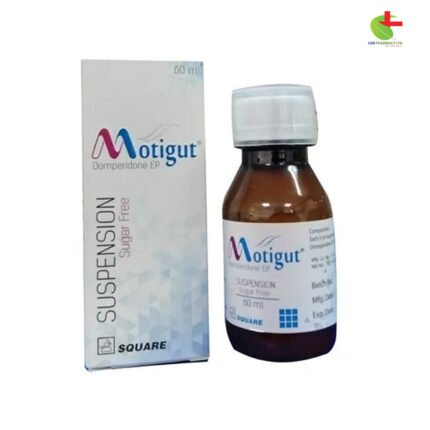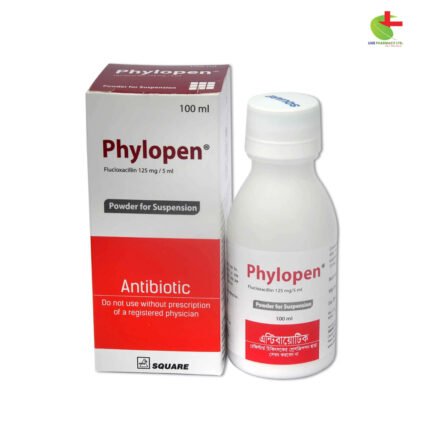Fexo Oral Suspension
55.00৳ Pcs
- Fexo provides relief for allergic rhinitis and chronic idiopathic urticaria symptoms in adults and children aged 12 and older.
- Its potent yet selective affinity for H1 receptors effectively alleviates sneezing, runny nose, itching eyes, and other allergic discomforts.
- Fexo’s unique pharmacological profile minimizes CNS effects, making it suitable for daily use without impairing cognitive function.
- Versatile dosage options and minimal interactions ensure tailored treatment for diverse patient populations, enhancing overall quality of life.
 Brand
Brand
|
Square Pharmaceuticals PLC |
|---|---|
 Generics
Generics
|
Fexofenadine Hydrochloride |
 Type
Type
|
Suspension |
 Size
Size
|
50 ML |
Indications
For both seasonal and perennial allergic rhinitis, Fexo is recommended for relieving symptoms in adults and children aged 12 and above. These symptoms include sneezing, runny nose, watery eyes, and itching of the eyes, nose, palate, or throat. Fexo not only alleviates these discomforts but also enhances overall health-related quality of life and productivity in daily activities.
In cases of chronic idiopathic urticaria, Fexo provides relief from associated symptoms in adults and children aged 12 and older. It effectively reduces the signs and symptoms of chronic idiopathic urticaria, including wheals and itching, thus improving health-related quality of life and work/activity productivity.
Pharmacology
Allergic reactions are mediated by the H1 histamine receptor, which triggers hypersensitivity responses. Exposure to allergens prompts mast cells and basophils to release histamine and other inflammatory mediators. Fexofenadine, an “inverse agonist” of the H1 receptor, binds to and stabilizes its inactive form, preventing activation and subsequent inflammatory responses. With its potent and selective affinity for H1 receptors, Fexofenadine effectively mitigates allergic symptoms without crossing the blood-brain barrier, thus avoiding significant CNS effects.
Dosage & Administration
For allergic rhinitis in adults and children 12 years and older, Fexo is typically administered at 60 mg twice daily, 120 mg once daily, or 180 mg once daily. Dosage adjustments are recommended for individuals with impaired renal function. Similarly, for chronic idiopathic urticaria, dosage regimens vary based on age and renal function, ensuring optimal therapeutic outcomes.
Interaction
Unlike hepatically metabolized drugs, Fexo minimizes the risk of hepatic interactions. Although coadministration with erythromycin or ketoconazole may increase plasma fexofenadine levels, no significant adverse effects have been observed. However, concurrent use with antacids containing aluminum and magnesium hydroxide may reduce Fexo’s bioavailability, necessitating a time interval between administrations.
Contraindications
Fexo should not be used in patients with known hypersensitivity to Fexofenadine Hydrochloride or its components.
Side Effects
Adverse effects associated with Fexo use are typically mild and include headache, drowsiness, dizziness, and nausea. Rarely reported adverse reactions may include hypersensitivity reactions, insomnia, tachycardia, diarrhea, and skin disorders.
Pregnancy & Lactation
Limited data exist on Fexo use during pregnancy, thus caution is warranted. Similarly, due to potential transfer into breast milk, Fexo is not recommended for lactating mothers.
Precautions & Warnings
Special consideration is advised for older adults and those with renal or hepatic impairment when administering Fexo. Patients with cardiovascular disease should be informed of potential adverse reactions such as tachycardia and palpitations. While Fexo typically does not impair cognitive function, individual responses may vary, warranting caution when driving or operating machinery.
Use in Special Populations
Dosage adjustments are necessary for patients with renal impairment, while moderate to severe hepatic disease minimally affects Fexo pharmacokinetics. Elderly patients may experience increased Fexo bioavailability but exhibit similar adverse event profiles compared to younger individuals.
Overdose Effects
Symptoms of Fexo overdose include dizziness, drowsiness, fatigue, and dry mouth. While no established maximum tolerated dose exists, standard measures for overdose management should be followed.
Therapeutic Class
Fexo belongs to the class of non-sedating antihistamines, effectively treating allergic symptoms without causing significant drowsiness.
Storage Conditions
Fexo should be stored in a cool, dry place away from light and heat, ensuring it remains out of reach of children.
Chemical Structure
Fexofenadine Hydrochloride, with a molecular formula C32H39NO4, serves as the active ingredient in Fexo, blocking histamine receptors to alleviate allergy symptoms.
Quick Tips
- Fexo 60 mg Tablet effectively treats allergy symptoms without causing significant drowsiness.
- Avoid consuming fruit juices such as grapefruit, orange, or apple with Fexo 60 mg Tablet, as they may reduce its effectiveness.
- Stick to simple meals to minimize nausea associated with Fexo 60 mg Tablet.
- Do not use antacids within 30 minutes of taking Fexo 60 mg Tablet to prevent decreased absorption.













Reviews
There are no reviews yet.